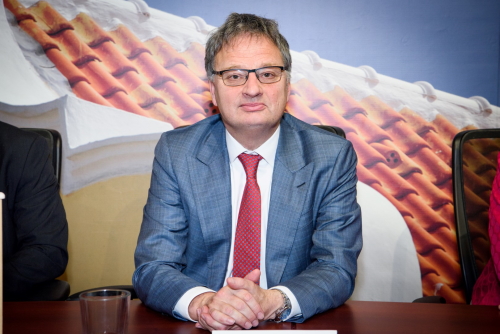 PHILIPSBURG:--- The tax revenues of Sint Maarten are lagging behind the economic growth. For 2022, despite real economic growth of 12 percent, a considerable budget deficit is expected by the country. The Cft urges the country to limit expenditures and increase tax revenues by taking compliance-enhancing measures. For example, the introduction of a casino tax and ending the exemption from sales tax on goods upon import would be good steps in this regard.
PHILIPSBURG:--- The tax revenues of Sint Maarten are lagging behind the economic growth. For 2022, despite real economic growth of 12 percent, a considerable budget deficit is expected by the country. The Cft urges the country to limit expenditures and increase tax revenues by taking compliance-enhancing measures. For example, the introduction of a casino tax and ending the exemption from sales tax on goods upon import would be good steps in this regard.
The economy is recovering significantly. The economy of Sint Maarten expanded by 4 percent in 2021 and the IMF expects a growth of 12 percent for this year. On the one hand, this is the result of the recovery of tourism and on the other hand because of the acceleration of repair work, such as the reconstruction of the airport. Private investment is also expected to accelerate significantly in 2022. Sint Maarten should use this economic recovery to put the public finances in order.
2022 budget and following years
On February 4th, Sint Maarten received approval from the Kingdom Council of Ministers to be allowed to deviate from the central budget standards for the 2022 budget year. The adopted budget for 2022 shows a deficit of ANG 124 million on the exploitation budget. Sint Maarten can achieve a lower deficit by limiting expenditure now and by increasing tax revenues. Regarding expenditures, Cft mainly insists on a reduction in the charges for goods and services. Cft emphasizes that it is of great importance that a balanced budget is achieved on the exploitation budget in 2023 and surpluses in the following years so that a start can be made on paying off the national debt. Sint Maarten, for example, is obliged to repay a loan of ANG 73.5 million in 2025, which still arises from the debt restructuring in 2010. Furthermore, it is important that Sint Maarten provides a satisfactory explanation of the intended investments in the 2022 budget and for later years. In consultation with the Netherlands, it will then have to be explored whether Sint Maarten is able to take out loans for capital investments in anticipation of a balanced exploitation budget in 2023.
Increase tax revenues
Also from an international perspective, the (tax) revenues on Sint Maarten are on the low side at approximately 20 percent of the Gross Domestic Product (GDP). This is troublesome as Sint Maarten does not generate sufficient income to cover the annual costs and generate surpluses. It is therefore important that in short-term Sint Maarten implements the recommendations from the March 2021 IMF report on tax reforms. The Cft advises, amongst others, to implement the recommendations on casino tax, an increase of excise duties, and the introduction of an import tax on goods. Currently, private individuals on Sint Maarten are exempt from tax when importing goods. This is an undesirable situation because people turn to online purchases, as a result of which Sint Maarten misses out on tax revenue.
Wage subsidy scheme audit
Sint Maarten is lagging behind in determining the final amount of the wage subsidy provided during the years 2020 and 2021. In the meetings, the Cft emphasized repeatedly that a final determination has to take place as soon as possible and that wage subsidy received in excess has to be repaid. In 2020 Sint Maarten paid out ANG 72 million in wage subsidies to companies. Sint Maarten expects to pay out approximately ANG 31 million in wage cost subsidies in 2021. Cft has requested the Minister of Finance to complete the audit on the wage cost subsidy programs for 2020 and 2021 on April 1st and May 1st, 2022, respectively.
Health care funds
The financial situation of the healthcare funds on Sint Maarten is unsustainable. In short-term Sint Maarten must raise the wage limit for the Health Insurance Fund/Accident Fund to ANG 120,000. The contribution for employees in the public sector will also have to be brought more in line with the private sector and political authorities will have to start contributing to health insurance. The Cft once again emphasizes the importance of substitution of specific medicine by generic ones. Herewith, Sint Maarten can save an amount of at least ANG 6 million annually.
Financial management
As is well known, Sint Maarten's financial management has been falling short for many years. Cft is positive about the attention given to financial management in the Country Package and emphasizes the importance of improving financial management in collaboration with COHO that is being established. It is imperative that the discussion with the Netherlands about making support available for this program is concluded as soon as possible so that Sint Maarten can intensify the efforts on this essential project. The Cft also insists that the agreements made on the adoption of the annual accounts are strictly observed.
On February 22nd and 23rd, the members of Cft Curaçao and Sint Maarten spoke virtually with the Governor, the Prime Minister, the Minister of Finance, the Minister of Health, Social Affairs and Labor, and the Finance Committee of Sint Maarten’s Parliament. The Cft also spoke with the Sint Maarten Hospitality and Trade Association (SHTA) and the board of Social Health Insurance (SZV).
On February 21st Cft Bonaire, Sint Eustatius and Saba spoke virtually with the deputy government commissioner and the head of Finance of Sint Eustatius.
Recently, two new members have joined the Boards, namely Mrs. Julisa Frans as a member upon the proposal of Sint Maarten for the Cft Curaçao and Sint Maarten and Mr. Hans Hoogervorst as a member upon the recommendation of the Netherlands for the Board of Aruba financial supervision, Cft Curaçao and Sint Maarten and Cft BES.









